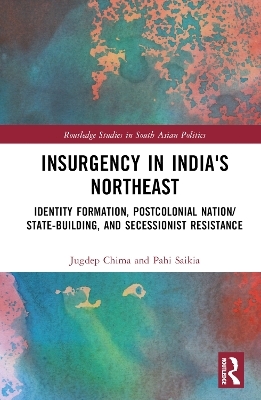
Insurgency in India's Northeast
Routledge (Verlag)
978-1-032-48422-8 (ISBN)
Insurgency in India’s Northeast provides a systematic analysis of every major secessionist group and insurgency in the region within a unified and original explanatory framework, focusing primarily on the postcolonial period.
This book presents a parsimonious analytic narrative involving a rich sequential account of the historical evolution of Mizo, Naga, Meitei, and "ethnic Assamese" identities from precolonial to colonial to postcolonial times. Avoiding essentialist or primordialist arguments, the chapters in the book demonstrate how ethnic/(sub)national identities are dynamic and malleable phenomenon, not immutable natural givens. In particular, it argues that the postcolonial Indian state has attempted to integrate these ethnic/sub-state national groups into the Indian Union through a combination of democratic accommodation/consociationalism and hegemonic/violent control, strategically designed to encapsulate their evolving (sub) national identities into the overarching state-sponsored Indian nationality.
Through this book, readers will gain a rich understanding of the dynamics of ethnicity/ nationality and the nation/state-building process in postcolonial India. It will be of interest to researchers in the fields of Asian studies, ethnicity, nationalism, separatism, security studies, border studies, and international relations.
Jugdep S. Chima is Associate Professor of Political Science and International Studies at Hiram College, USA. He is the author of The Sikh Separatist Insurgency in India: Political Leadership and Ethnonationalist Movements (2010) and the editor of Ethnic Subnationalist Insurgencies in South Asia: Identities, Interests, and Challenges to State Authority (2015). He has published numerous articles in journals such as Asian Survey, Journal of Commonwealth and Comparative Politics, Review of International Studies, Studies in Conflict and Terrorism, and Third World Quarterly on topics relating to the political economy of conflict, political parties and group conflict, individual participation in insurgency, and ethnicity and democracy. Pahi Saikia is Associate Professor of Political Science at the Indian Institute of Technology Guwahati, India. She is the author of Ethnic Mobilisation and Violence in Northeast India (2011). She has also co-edited a book with Anasua Basu Ray Chaudhury titled India and Myanmar Borderlands: Ethnicity, Security and Connectivity (2019). She has published articles in peer-reviewed journals including Political Psychology, India Review, South Asian History and Culture on political behavior, ethnofederalism, identity-digital media nexus, women in post-conflict zones, and India's multilateral connectivity.
Chapter 1. Introduction; Chapter 2. Theoretical Concerns & Analytical Framework; Chapter 3. The Mizos of Mizoram: From Ethnic Rebellion to Successful Political Integration into the Postcolonial Indian Union; Chapter 4. The Nagas of Nagaland: Sustained Armed Resistance to Political and Cultural Incorporation into the Indian Union; Chapter 5. The Meitei Rebellion in Manipur: Community Memory, Contested Accession, and Deepening Integration into the India Union; Chapter 6. "Ethnic Assamese" Rebellion in Assam: Amorphous and Fractured Regional Identity, and Deepening Integration into the India Union; Chapter 7. Conclusion
| Erscheinungsdatum | 05.09.2023 |
|---|---|
| Reihe/Serie | Routledge Studies in South Asian Politics |
| Zusatzinfo | 8 Line drawings, black and white; 2 Halftones, black and white; 10 Illustrations, black and white |
| Verlagsort | London |
| Sprache | englisch |
| Maße | 156 x 234 mm |
| Gewicht | 453 g |
| Themenwelt | Naturwissenschaften ► Geowissenschaften ► Geografie / Kartografie |
| Sozialwissenschaften ► Politik / Verwaltung | |
| Sozialwissenschaften ► Soziologie ► Spezielle Soziologien | |
| ISBN-10 | 1-032-48422-5 / 1032484225 |
| ISBN-13 | 978-1-032-48422-8 / 9781032484228 |
| Zustand | Neuware |
| Informationen gemäß Produktsicherheitsverordnung (GPSR) | |
| Haben Sie eine Frage zum Produkt? |
aus dem Bereich


